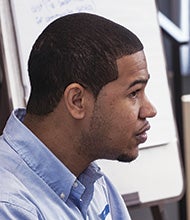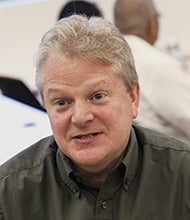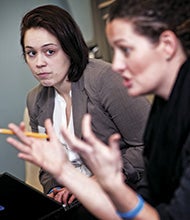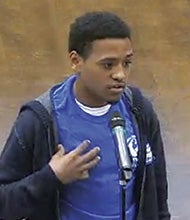20,000 Voices
Exploring Big Questions About Community, Equity, and Diversity at URI
“We ask you to lift your voice and be heard, because we are listening!” So said Associate Vice President for Community, Equity, and Diversity Naomi R. Thompson at a February 26 “Open Space” meeting. All 20,000 URI students, faculty, and staff are already feeling the effects of the work that began then and is still in progress: the concerns voiced and heard, the to-do lists generated, and the overall process of growing into an institution where shortcomings lead to self-examination, frustration becomes empowerment, and criticism ignites positive change.

“Some of these [student] organizations have changed their initial mission or their process altogether to try to conform, and in doing so… lost the sense of their organization.” Judicial Affairs Coordinator Kevin Martins ’07, M.B.A. ’10

“We don’t often think of fine arts as a human rights issue, but it’s hard to talk about multiculturalism if you’re not talking about a people’s culture or their art.”Associate Professor of Music Mark Conley

“We’re doing a lot of mentorship things here, but [we should be] finding some way to centralize that and make sure the students who need it are getting mentored, and the students who would be wonderful mentors get the training and opportunities they need.”Admission Advisor Erin West ’04, M.S. ’09

“Diversity is nothing without unity. You can be as diverse as you want, but really we need unity on this campus to get to those places where we want to be.”Communication Studies Major Jermaine Stephens
Spearheaded by the Office of Community, Equity, and Diversity, and co-sponsored by the Office of the President, Office of the Provost, and Division of Student Affairs, the “20,000 Voices” event in February adhered to the Principles of Open Space Technology. These include “Whoever comes are the right people” and “Whatever happens is the only thing that could have happened.”
“One of the things that has always inspired me in the years that I’ve done social justice work,” said LGBTQ Center Director Annie Russell, “is thinking about how we really do grassroots work from the ground up.” Invoking activist Audre Lorde’s famous words, “The master’s tools will never dismantle the master’s house,” Russell defined Open Space as a way of “finding our own tools to create and build the kind of future we would like to see at the University of Rhode Island.”
That first event in the Memorial Union featured a full day of speeches and discussions. Assistant Director for Student Leadership Development Melissa Boyd-Colvin ’98, M.S. ’03 served as facilitator and emcee. There was an electrifying keynote speech by entrepreneur, television journalist, and documentary film producer Liz Walker (who less than two months later led the Interfaith Mass held in Boston for marathon bombing victims). There were power-point presentations, introductions and lists, food and coffee and nametags, chairs arranged in rows and chairs arranged in circles. Some people spoke into microphones; others simply raised their voices. “Naomi spoke about this being an inclusive process,” explained Coordinator of LGBTQ Programs & Services Annie M. Kosar (known as “Annie M”), “because Community, Equity, and Diversity, as an office, belongs to URI and is the URI community.”
All of the far-ranging discussion topics came from participants themselves. Academic Enhancement Center Coordinator David Hayes led a session called “White Like Me: Undoing Whiteness and Doing Justice on Campus.” “The students especially raised a lot of really good questions,” he reported: “‘How did I get to be a white person, and what does it mean to be a white person in today’s society?’” Counseling Center Director Robert Samuels led the group discussing “Diversity Burnout: ‘I’m Tired But the Work’s Not Done.’” He summarized, “Having someone you can hand it off to, like a relay race, is another way of saying, ‘Somebody else is carrying the ball, so I don’t have to feel totally or solely responsible for it.’”
To insure that the conversation wasn’t over, an official end-of-day vote count defined future priorities. Vice President for Student Affairs Thomas Dougan, in pledging the full support of his division, had said at the start of the day, “Success depends on our collaboration and cooperation in working together.” Indeed, the work was just beginning. Whether or not they’d attended the event, all URI faculty, staff, and students were invited to join follow-up subcommittees; many accepted the invitation. As subcommittee co-leaders, graduate students from Associate Professor of Human Development and Family Studies Annemarie Vaccaro’s Organization Development class (HDF 562) held discussions throughout the spring semester, researching “best practices” at other institutions and helping their groups propose concrete steps for change here at URI.
Two days after classes ended, these subcommittee leaders presented their findings and recommendations to the entire campus community. Under Vaccaro’s guidance, they’d been thorough—and specific. Their recommendations include gatherings to be held, conversations to be had (some of them, no surprise, on uncomfortable topics), initiatives to be begun, ongoing work to be consolidated and continued, websites to be established as information clearinghouses, and in many cases—again no surprise—money to be spent, perhaps personnel hired, even in these financially challenging times.
“I call upon you to get involved,” Naomi Thompson said to the audience gathered, on what was a gorgeous spring day, inside the new pharmacy building’s sleek new auditorium. Invoking Barack Obama’s words, “We are the change that we seek,” Thompson added, “We must engage in this work together if we want to make progress—and there’s lots of work to be done.”
PRIORITY ACTION ITEMS VOTED BY 20,000 VOICES ATTENDEES
• Building bridges across student organizations
• Funding and support for multicultural student organizations
• Gender inclusion on campus
• Inclusive pedagogy
• LGBTQ visibility and Center outreach
• Native Americans at URI
• Neurodiversity at URI
• Recruitment and retention of multicultural and low-income students
• Recruitment and retention of underrepresented faculty
• Students with children
• What role can arts play in our diverse community?
–Gigi Edwards
 Home
Home Browse
Browse Close
Close Events
Events Maps
Maps Email
Email Brightspace
Brightspace eCampus
eCampus


